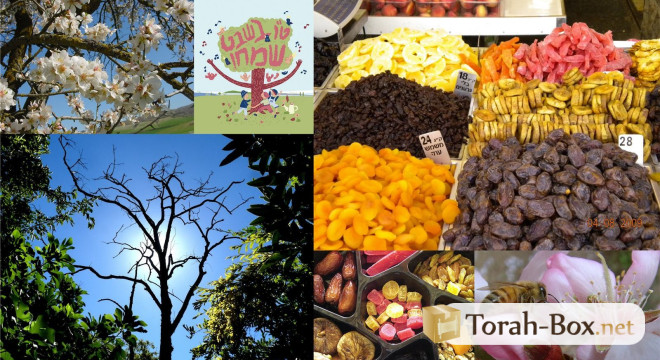
Tu BiShvat
About Tu BiShvat
Although the day of Tu BiShvat is not a 'real' festival like the days of Yom Tov, some customs have been introduced to differentiate it from ordinary days.
Thus, during the morning prayer of Shacharit on Tu BiShvat, and in the afternoon prayer of Mincha on the day before Tu BiShvat, (like the importance of the day begins at night,) Tachanun (supplication prayer) is not recited.
Similarly, no eulogies are given for a dead person.
We usually eat a lot of fruits from Eretz Israel. In particular, it is desirable to consume a new fruit that we have not eaten since Rosh Hashana, in order to recite the blessing of Shehechiyanu.
The day of Tu B'Shvat, characterizes the "New Year of Trees", which is also a moment of prayer and judgment. Indeed, when each of His creatures develops, the Holy One, Blessed Be He, has the habit of observing all that the creature has done and will do throughout its life. This moment is particularly conducive to prayer for success.
Since the Torah compares man to a tree of the field, this day is also a day of judgment for the man himself. Therefore, it is recommended to repent at this time and to commit to improving one's actions. The book "Bnei Yissachar" writes regarding this that there is a tradition to pray to Hashem on Tu BiShvat to make us find a beautiful and kosher Etrog for the festival of Sukkot, because it is on this day that the sap rises in the trees and that the fruits develop the substance which will allow them to take their definitive form.
The book "Bedside Mussar" also writes (chapter 16) that in the testament of Rabbi Eliezer the Great it is reported: "My son, pay attention to the fruits of Tu B'Shvat because it is a custom". Thus, some organize a study session on the night of Tu BiShvat during which they learn passages from the Mishna and Zohar which relate to the nature of this day. A book, called "Peri Eitz Hadar" compiles all of these passages especially recited in Tu BiShvat.
Our Sages teach that whoever reads a verse or passage from the Talmud dealing with the present moment brings blessing to the spiritual and material spheres. It is important to understand what is being studied as much as possible, especially when it comes to the laws (Halachot) that relate to Tu BiShvat and the mitzvot that relate to the land of Israel.
One should eat the fruits before reciting Birkat HaMazon and not after, even if by doing so, we would be able to recite the blessings of "Al Ha'Eitz" and "Borei Nefashot”, since according to many decision-makers, this would be reciting a blessing unnecessarily, and therefore pronouncing the name of G-d in vain. Some people have the habit of softening the Etrog and cooking it in sugar to make a jam that will be eaten on Tu BiShvat. According to some, this practice has the ability to "bringing happiness" to pregnant women by giving them an easy delivery.
One should not recite the blessing "Shehechiyanu" when eating the Etrog, because it was already said on Sukkot at the time of taking the four species.
Note that one must be very careful to check the fruits, to make sure that they do not contain worms and other insects. Finally, before the onset of Tu BiShvat, it is advisable to learn all the laws of precedence existing between the different blessings so as not to risk pronouncing a blessing unnecessarily.
Sources: Sefer HaTodah, Taamei HaMinhagim, Yalkut Yosef
Torah-Box.net Account
To access the entire Torah-Box.net website, sign up for free in less than a minute.
Weekly Parsha
 Candle Lighting - New York
Candle Lighting - New York
Friday April 25th, 2025 at 19:28 *Shabbat ends at 20:32 *
change my location
* Times given as an indication, check the times of your community






